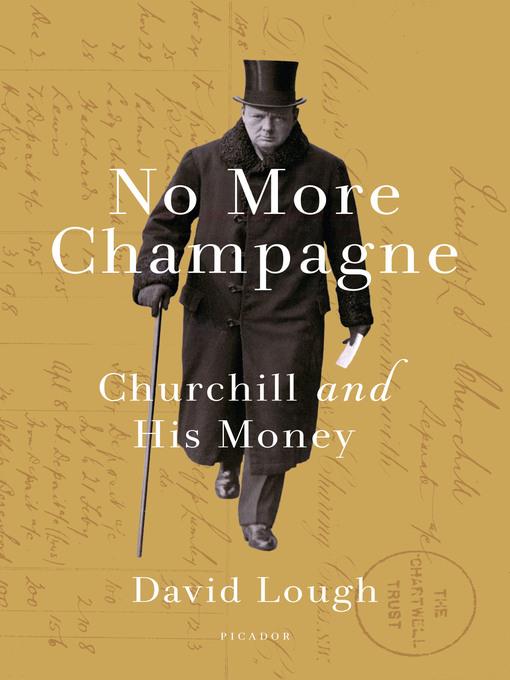
No More Champagne
Churchill and His Money
کتاب های مرتبط
- اطلاعات
- نقد و بررسی
- دیدگاه کاربران
نقد و بررسی

Starred review from September 28, 2015
Debut author Lough, an investment advisor, succeeds beyond any reasonable expectation in making this unique chronicle of Winston Churchill’s money problems fascinating, even for those with limited interest in financial matters. Lough traces Churchill’s spendthrift ways to his parents, Randolph and Jeanette, both from once-wealthy families contending with diminished resources by the time the two met in 1873. From a young age, the future prime minister was preoccupied with money (he would later say it was “the only thing that worries me in life”), and his family’s straitened circumstances led him and his brother to sell eggs for extra pocket money. As an adult, Churchill’s financial woes were often of his own making. To compensate, he became a prolific author, considering no commission too small or unimportant: in 1937, he was hired to write short summaries of four battles illustrated on jigsaw puzzles. Lough’s detailed, but fast-moving, narrative succeeds in making one of British history’s most prominent men more relatable; as Lough notes, “it is salutary to discover that one of the most successful political figures of the 20th century ran up huge personal debts, gambled heavily, lost large amounts on the stock exchange, avoided tax with great success, and paid his bills reluctantly.” Agent: Andrew Lownie, Andrew Lownie Literary Agency (U.K.).

September 1, 2015
Just when you thought there could not be another angle to this endlessly fascinating character, here's a serious, thorough look at Winston Churchill's lifelong struggle to pay the bills. Writing for hire allowed Churchill to keep the bank at bay over many decades, as noted scrupulously by English financial officer Lough, who asserts that, during his long career advising families about their finances, he has "never encountered risk-taking on Churchill's scale." Hailing from a family of spendthrifts, especially his American-born mother, Churchill recognized early on in his political career that he would have to supplement his official government salary by writing journalism, giving lectures, buying polo ponies, and speculating in the stock market, thanks to his financial guru brother, Jack. Like his mother, Churchill patronized only the best suppliers, and he was often scrambling to pay the bills, borrowing hugely to cover amounts owed to wine, cigar, shirt, and saddle merchants. His marriage to Clementine Hozier did not greatly add to his wealth, though his elevation to First Lord of the Admiralty in 1909 allowed him use of the HMS Enchantress and a fine Admiralty House in central London. While World War I impoverished a generation of Edwardian aristocracy, transforming them into a "new class of entrepreneurs," Churchill managed to inherit a tidy sum from a distant cousin in 1921, quickly depleted by the purchase of a country seat and the birth of his fifth child and prompting stock market speculation. (Miraculously, he was appointed chancellor of the exchequer in 1925.) The U.S. stock market crash wiped out Churchill's "new world fortune" (for each chapter, Lough offers a contemporary exchange rate and inflation multiples) without dampening his enthusiasm for America's "vitality...[to] help shape his wartime strategy a decade later." Chockablock with credits, debits, taxes, and inheritances, the book is nothing if not meticulous. Moving in a stringent chronology, the author's impressive nuts-and-bolts account finds Churchill's golden years crowned by selling his memoirs and film rights.
COPYRIGHT(2015) Kirkus Reviews, ALL RIGHTS RESERVED.

September 15, 2015
This well-written, deeply researched tome investigates the remarkably complex world of Winston Churchill's (1874-1965) financial affairs during the years he served as prime minister and into his retirement. In this debut, Lough, whose professional career includes involvement in both banking and finance, crafts a detailed account of Churchill's love-hate relationship with money. Poring through years of financial records that Churchill painstakingly kept, Lough traces the highs and lows of the man's finances. The politician was a heavy gambler and a brilliant writer; we learn that the second attribute was often essential in helping bail him out of the baleful effects of the first. The author explains how Churchill dabbled in various pursuits to booster his finances: authoring books, writing columns for the Evening Standard, speculating on stocks, investing in film, and reluctantly going on lecture tours. Also mentioned are his brother Jack, who assisted in paying debts, and Churchhill's wife, Clementine, who was adept at managing her husband's financial mishaps. VERDICT Even enthusiasts who think they've learned everything there is to know about Britain's most intriguing politician will find much to discover in this lengthy work. An important contribution to the vast literature on Churchill and recommended for most collections.--Ed Goedeken, Iowa State Univ. Lib., Ames
Copyright 2015 Library Journal, LLC Used with permission.

























دیدگاه کاربران